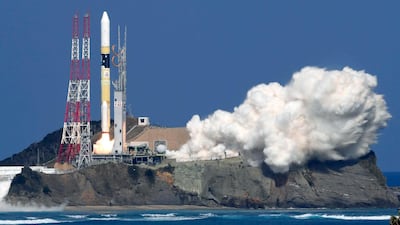The 1960s are rightly heralded as the golden era of space exploration. The touchpaper for the space race was lit by US president John F Kennedy in 1961, after he emboldened Nasa to send a manned mission to the Moon by the end of the decade.
He delivered his rallying call during one of the peaks of the decades-long Cold War rivalry with the Soviet Union, shortly after the embarrassment of the Bay of Pigs invasion – Kennedy's ill-conceived plan to overthrow Cuba's Fidel Castro and fillet communism out of America's backyard.
With the US bruised by this failed military adventure, its president needed a big idea to express his nation's power and demonstrate its technological supremacy. It was a spectacular and successful gamble. The US spent $25bn in its race to make Kennedy's vision a reality (roughly $150bn in today's money), but the idea and its delivery remains one of the 20th century's best examples of a confluence of soft and hard power. The 50th anniversary of the Apollo 11 mission will be marked this July.
Today, space is no longer seen through the binary prism of Cold War rivalry, and more than 70 countries have such ambitions. India launched a Mars orbiter in 2013 at a reported cost of $74m. The Mangalyaan mission demonstrated to stunning effect that the cost of space exploration does not have to be ruinously high. By comparison, The Martian film starring Matt Damon, released the following year, cost Hollywood more than $100m to make. India will launch its second lunar mission later this month. The global private sector has also been pushing development at rapid speed. Elon Musk's SpaceX company may make a manned mission to space in June, although his organisation faces competition from several other rivals.
Last weekend, the Kingdom of Saudi Arabia became the latest member of the space club. It is the seventh nation in the Arab world to open an agency and the third in the Gulf, following the UAE and Bahrain.
The formation of the Saudi Space Agency was part of a broader Government reshuffle by King Salman. The reorganisation installed Prince Sultan bin Salman at the agency's helm. In terms of experience, there is no one better qualified for the job. The prince was the first Arab to travel to space in June 1985, aboard the Space Shuttle Discovery and responsible for the successful deployment of ArabSat-1B.
The establishment of the agency by royal order sets up an intriguing and, in all likelihood, friendly regional rivalry between Saudi Arabia, the UAE and Bahrain.
What we know about the kingdom's space agency is that it will continue the many years of work in satellite communications by the King Abdulaziz City for Science and Technology – Saudi Arabia has partnered with China on more than one project – and that the broader aim is to use the industry as another staging post towards Vision 2030's economic diversification plan.
In this country, the space programme has similarly clear goals and has already made significant strides forward. KhalifaSat, manufactured by a team of Emirati engineers, was launched last October. In April 2019, the first Emirati astronaut will travel to the International Space Station aboard Russia's Soyuz MS-12. The following year, the Hope or Al Amal Mars unmanned probe will launch and is due to arrive at the red planet in the UAE's 50th year. The country aims to build a settlement on Mars by 2117.
The substance behind the big idea of the UAE space programme is clear: more than 150 Emirati scientists are involved in the Mars mission, complemented by hundreds of organisations. The value of UAE space investments has been estimated at Dh20 billion, representing around 2 per cent of the total of the global space industry. For space projects, read economic diversification and growth.
As Sheikh Mohammed bin Rashid, Vice President and Ruler of Dubai, commented in 2015, the Mars mission will also send three important messages. "The first is for the world: that Arab civilisation once played a great role in contributing to human knowledge and will play that role again. The second is … that nothing is impossible and that we can compete with the greatest of nations in the race for knowledge. The third is [to] set no limits to your ambitions."
Last year, the UAE signed a co-operation deal with Bahrain to share expertise between their respective space agencies. A "strategy of resolve" has been cultivated by the Saudi-Emirati Coordination Council, which jointly presides over 175 economic and development initiatives and projects. Space is not yet one of those, but the presence of three space agencies in the Gulf, two of them already sharing information, should firmly seed the regional race towards innovation.
In the opening hours of this year, the New Horizons Nasa spacecraft visited Ultima Thule, an object 6.4 billion kilometres from Earth, demonstrating, perhaps, how far a shot at the Moon five decades ago can take you. The Gulf agencies should take inspiration and encouragement from that landmark achievement.
Nick March is an assistant editor-in-chief at The National


